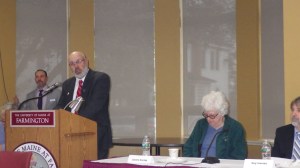Editor’s note: This is the first in a three-part series from the candidates forum at the University of Maine at Farmington on Wednesday. Each state legislative candidate who was present was asked to respond to three questions. The first question was: What do you think is the most critical topic facing Maine today, and what should be done about it?
FARMINGTON — Taxes, the economy, and MaineCare expansion were among the topics tackled by local legislative candidates at a forum organized by the Franklin County Chamber of Commerce on Wednesday at the University of Maine at Farmington.
Asked what they thought was the most critical topic facing Maine today and what should be done about it, the candidates cited the economy and jobs.
“We have a great workforce,” said Sen. Tom Saviello, R-Wilton, who is running for a fourth term in Senate District 17. He said that overregulation and the state’s high energy costs were detrimental to doing business.
Saviello noted that the forest products industry, such as biomass and wood pellets, was one of the economic strengths of rural areas such as western Maine.
His opponent, Democrat Joanne Dunlap of Rangeley, agreed that jobs and the economy are important, and offered a different perspective on strengthening the region’s economy.
“I’m concerned to some extent with education,” she said. “We have geared education toward college and we’ve let go of the types of jobs they’re learning over at Foster Tech.”
Dunlap emphasized solar energy as a means of lowering energy prices.
“The economy in rural Maine is the No. 1 issue, without a doubt,” said Rep. Russell Black, R-Wilton, who represents House District 114. “We still have two Maines, whether we like it or not.”
What rural Maine does offer, he said, is land, wood fiber and water. Black suggested enhancing the forest products industry, especially biomass and wood pellets, and helping local farmers provide food to the region.
“Don’t forget tourism,” he said. “We’re the gateway to a lot of Maine and we need to promote that.”
Democrat Guy Iverson of Chesterville, who is running against Black, emphasized solar energy. If solar panels are put on homes, he said, it will help create jobs. Manufacturing wind turbines could serve as another form of job creation, he said.
Intertwined with jobs and health care is that Maine and the rest of the U.S. are aging, said Lance Harvell of Farmington, the Republican candidate for House District 113. Maine is the oldest state in the nation, he noted.
“That affects people when they come here to invest,” Harvell said.
In addition to high energy costs and an aging workforce, high taxes are holding businesses back, he said. Rising health care costs also play a significant role.
“When health care costs rise, your wage is eaten up by that,” Harvell said.
His opponent, Democrat Scott Landry of Farmington, said, “The aging population and the youth leaving our state for jobs elsewhere are the biggest concerns here.”
Getting reliable broadband internet service would also help, and lowering energy costs is key, he said.
“We’ve got to add value to what we have here,” Landry said, “but we’ve got to keep our kids here.”
Keith Cornelio of Jay, the Republican candidate for House District 74, which includes Jay, Livermore Falls, and part of Livermore, said, “In my opinion, the most critical topic facing this country today is debt, and we’re a party to that. That’s my motto: We’ve got to pay for the house if we want to keep it.”
His Democratic opponent, Tina Riley of Jay, was not able to attend.
Democrat Barbara Chassie of Phillips, who is running against Tom Skolfield, R-Weld, for House District 112, agreed with the others on the importance of the economy to the area’s survival.
“We have a great quality of life and a great environment here, but if we can’t afford to live here, it doesn’t matter much,” she said.
Chassie said many people are working harder to maintain a lower standard of living than their parents enjoyed.
“We need fact-based, evidence-based solutions,” she said. This includes investing in workforce development to keep young people in Maine, she said.
Skolfield pointed out Maine’s high energy costs.
“We have a high cost of energy which is driving employers away,” he said.
He sympathized with the elderly trying to cope with high property taxes and stay in their homes.
“We need to make sure those folks can survive and stay in their homes as long as they possibly can,” he said.

Comments are no longer available on this story